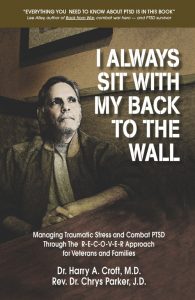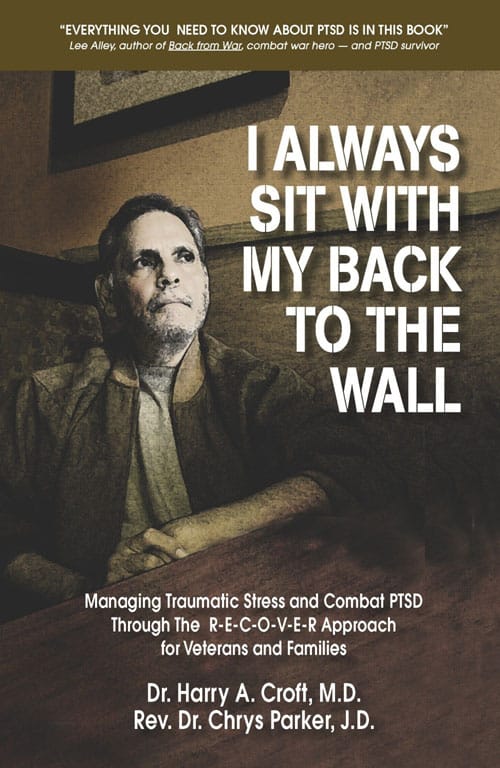 June 27th is designated as National PTSD Awareness Day.
June 27th is designated as National PTSD Awareness Day.
Post-traumatic stress disorder (PTSD) can affect anyone who experiences trauma: children and women who are abused, individuals who suffer serious accidents or injuries, people who have lived through disasters, veterans and soldiers who have been in combat, and anyone who has experienced trauma. Stress normally follows these kinds of experiences, but in some cases, the individual exhibits PTSD symptoms and may become unable to function normally.
There are many resources online to learn about PTSD, but I know of no better resource on the subject than I Always Sit with My Back to the Wall: Managing Traumatic Stress and Combat PTSD Through The R-E-C-O-V-E-R Approach for Veterans and Families by Dr. Harry Croft and Rev. Dr. Chrys Parker. I worked with the authors on this book for two years and am very proud of the results.
The book is basically a conversation between Dr. Croft (a psychiatrist who has evaluated thousands of veterans with PTSD) and Rev. Parker (a chaplain and trauma therapist). It is conversational and easy to read, but it includes complex information about the symptoms, causes, physiology, and–most importantly–the treatment of PTSD.
Although some of the material is most appropriate for those with combat PTSD, much of the book is useful for individuals who have PTSD from any trauma as well as families and people who have loved ones with PTSD.
The authors use the R-E-C-O-V-E-R approach to treating PTSD. Here is a summary of the approach from the book:
R – Recognizing When PTSD Is in Your Life
E – Educating Yourself about PTSD’s Effects on Your Thoughts, Feelings, and Behaviors
C – Connecting Your Biology to Your Psychology: Physiological Roots of PTSD
O – Organizing A Care Plan to Manage PTSD
V – Viewing Your Issues in a New Light
E – Empowering Yourself through Useful Systems of Support
R – Redefining The Meaning of Your Life: Seeking Posttraumatic Growth
One of the things I like best about the book is that it is holistic, covering all aspects of PTSD and recovery, including relationships and spirituality.
Stop Soldier Suicide reports that veterans and soldiers commit suicide more than twice as often as civilians, and PTSD is often the cause. If more vets and soldiers get treatment for their PTSD, lives will be saved.
Today is a good day to learn more about PTSD and share it with those who need it.

